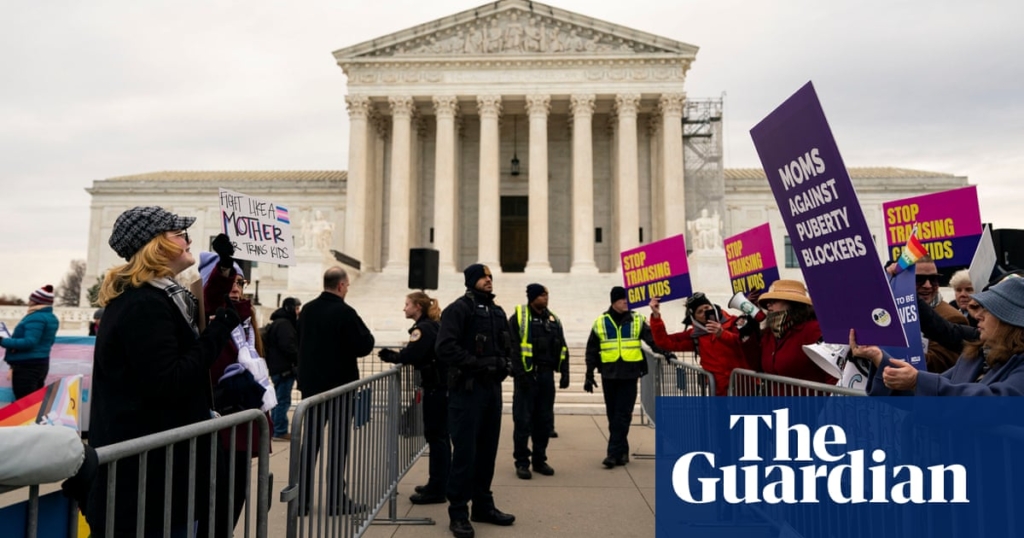As a majority of supreme court justices signaled support for a Tennessee law that would restrict gender-affirming care for minors, protesters in dueling crowds – including those with children personally impacted – rallied on the courthouse steps to make their own case regarding transgender rights Wednesday.
For the hundreds of demonstrators on a brisk morning, US v Skrmetti represents more than a massive legal battle – it’s a debate about identity, medical autonomy, government regulation and the fundamental rights of trans youth. And for Casey and Liesl Deck, that means travelling to Washington for the first time from Portland, Oregon to support the cause for their own trans child.
“With gender-affirming care, he can be his true self, it’s a testament that this really, really works,” Casey Deck said of his child. “We’ve just seen him blossom. Trans kids have been here forever, and we need to create space for them to be themselves.”
Where the Decks offer a family’s perspective, New York-based Jaime Crass, the national director of youth programs from Keshet, a Jewish LGBTQ+ advocacy organization, sees broader, systemic implications that could be supercharged under the incoming Trump administration.
“There’s a personal element that I’m seeing at a much more heightened degree today, and I think that’s important, because people need to remember that this is personal,” Crass said. “This is about human beings. We are talking about individuals like you and me who deserve to have their rights protected.”
The rally outside the court started with a legislative voice from progressive Oregon, Senator Jeff Merkley, who criticized political intervention in medical decisions from the podium.
“All Americans should have the freedom to make medical decisions in the privacy of their doctor’s office without politicians trying to dictate to them,” said Merkley, who authored the 2023 Equality Act to expand the Civil Rights Act to include discrimination based on sex, gender identity and sexual orientation.
Yet the conversation was not monolithic. Just a few steps away, backers of the Tennessee law such as Irene Lawrence, board secretary of the US chapter of Women’s Declaration International offered a different philosophical stance.
“The narrative is that it’s kind, that we should be kind, and we don’t think it’s kind to lie to kids and tell them that they can change their sex,” Lawrence said, arguing that the case could risk harming women and girls.
The case being challenged is part of a broader trend, with 26 states now restricting trans youth healthcare. Yet for demonstrators such as Silver Spring, Maryland local Lisa Guffey, who came to the rally with a group of friends, it’s not about the systemic issues but a matter of survival.
“I have a trans youth, and actually, my son is just receiving care right now,” Guffey said. “It’s who he is, and this is a matter of life and death for us, and it’s really important to allow parents, kids and providers to make the best decisions for their very lives.”
The Biden administration argued that the law discriminates arbitrarily, while state defenders claimed they’re protecting minors from premature medical interventions and that such decisions should be deferred until adulthood.
Notably, Chase Strangio – the first openly trans attorney to argue before the supreme court – represents the families challenging the ban. Elizabeth Prelogar, the US solicitor general, presented the administration’s arguments, while Tennessee’s state solicitor general, Matt Rice, defended the legislation.
Chief Justice John Roberts signaled the court’s conservative bloc’s hesitation to adjudicate the case, emphasizing medical complexities that distinguish this matter of sex discrimination from previous legal precedents. Roberts suggested that the nuanced medical dimensions of the case needs a legislative, rather than judicial, resolution.
“It seems to me that the medical issues are much more heavily involved than in many of the cases that you look to,” Roberts told Prelogar.
Brett Kavanaugh, another one of the court’s six conservative justices, also questioned whether there may be harms to allowing gender affirming care. “You say there are benefits from allowing these treatments, but there are also harms from allowing these treatments, at least the state says so, including lost fertility, the physical and psychological effects on those who later change their mind and want to detransition, which I don’t think we can ignore,” he said.
The supreme court’s eventual ruling will likely become a landmark decision in the ongoing national debate about transgender rights and should be expected by June.







Yorumlar kapalı.